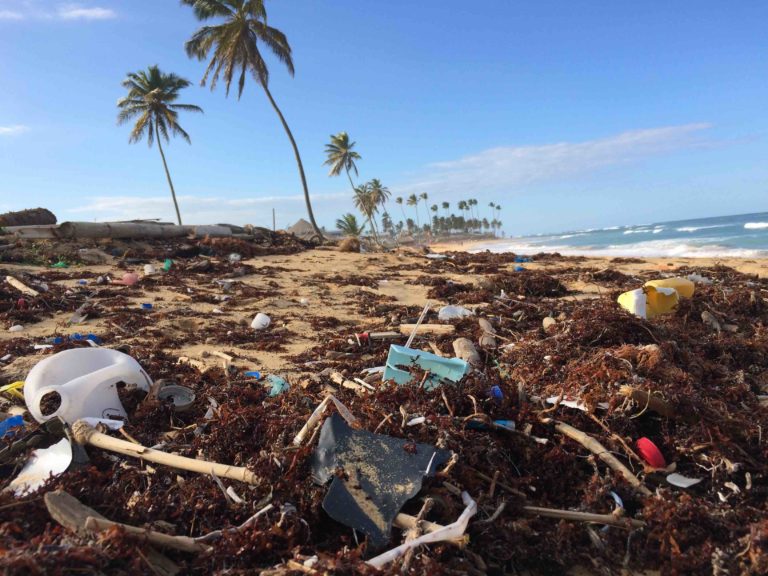Over the past year, more than half of UK consumers reported using less plastic in a phenomenon dubbed the “Attenborough effect” after Sir Richard Attenborough’s initiatives to raise awareness of plastic pollution.
During Lent, my Facebook feed was full of posts by friends giving up single-use plastic –which brought a barrage of ads for multiple-use produce bags and beeswax wrappers.
The attention to plastic waste has been followed, sadly and predictably, with a barrage of news coverage disparaging people’s efforts to reduce it. These articles mimic others suggesting it’s pointless to take small steps to reduce greenhouse gas emissions — or numerous other worthy goals.
It seems that with every sign of progress, the naysayers come out whining that it won’t work. The small solutions are too small to matter, they say.
You’ve probably seen the statistic that plastic straws make up only 0.03 percent of plastic waste in the ocean, and that we need bigger actions. Fair enough. But big and small are far from zero-sum.
The Minneapolis Star-Tribune even called anti-drinking straw bans “immoral” (!). The author made a fair but narrow argument: that some people with disabilities often need plastic straws because other materials don’t work for them. But “immoral”? Give me a break. There’s a simple solution: move ahead with the bans for general use and require a prescription for plastic straws.
Coming from the policy world and spending a lot of time with social entrepreneurs and impact investors, I completely “get” that if we want to solve big problems, we need scalable solutions and should focus the lion’s share of efforts on the most impactful activities.
Of course it’s important to think big. But thinking big and small go hand in hand. If an action requires minimal effort and can become a habit, why not take it and encourage others to do so as well?
Editors love to run stories about reports that supposedly claim that little acts don’t work. But they try way too hard.
Here’s one from The Guardian whose headline and kicker proclaim that it’s a mistake to campaign for small actions. Read the article, however, and you’ll find that the headline contradicts the story itself. The strongest conclusion the story can muster is that evidence is “weak and contradictory” that small acts can lead to bigger ones or to greater support for policies to combat climate change.
The writers conclude: “the existing evidence does not suggest that there is a big risk that people think they have already done enough when they have done small and simple things for the environment.”
Here’s another example: coverage of a study in Japan suggested that people who made small sacrifices –using less air conditioning, recycling, turning off lights—were more likely to oppose large-scale public policies like carbon taxes. The headline makes it sounds like the evidence is solid. But when you look at the methodology, the conclusion is more nuanced: it compared people who were asked to keep track of all the things they did to save energy or reduce waste, with people who were not asked to keep score.
The people who thought actively about all the things they did –and perhaps concluded that they had done their share—resisted national policies more than the ones who didn’t keep track. That suggests that when we internalize simple activities into habits, negative effects are minimal if they exist at all.
Early in my career, I learned how very much editors looooove counter-intuitive stories. But my early training as a journalist also taught me that truth is important, and too many reporters and editors seem to have forgotten that.
I’ve written here before about editors hopping on a popular trend and mimicking each other while missing the real story: trying to make a crisis out of people without celiac disease going gluten-free while ignoring the real problem which is that companies are claiming food is gluten-free when it is not. The same is true of climate change and the environment.
So what if straws are only a tiny fraction of total plastic waste? That does not mean we should ignore a small change in behavior that causes more good than harm.
The biggest problem in trying to clean up the mess that humans have made of the planet is that the task seems huge and overwhelming. Every little thing people can do, every accomplishment we can track, breaks a giant problem down to a series of achievable goals. And every goal achieved motivates people to do more.
Nothing says people will stop at giving up plastic straws, or choosing energy efficient appliances or modes of transportation, or reducing how much meat we eat. It’s far from likely that achieving one small goal will make mass populations decide that they’ve done all they can.
Running a non-profit organization, I learned from experience that supporters were more likely to make big commitments after being asked for small things first and seeing the impact of those small asks, like advice or introductions.
Here’s exactly how not to message the importance of dealing with climate change now: spew a barrage of reasons to give up.
No matter how hard self-styled cynics try to spin it otherwise, the little things we do make it more–not less— likely that each of us will be willing to do more. Even if that’s just a tiny bit, it’s worth it.
So remember to think small even as you think big.
This article is part of my new LinkedIn series, “Around My Mind” – a regular walk through the ideas, events, people, and places that kick my synapses into action, sparking sometimes surprising or counter-intuitive connections.
To subscribe to “Around My Mind” and get notifications of new posts, navigate to this post on LinkedIn and click the blue “Subscribe” button on the top right hand of the page. Please don’t be shy about sharing, leaving comments or dropping me a private note with your own reactions.
- The Gray Rhino Wrangler on Substack - January 1, 2025
- Gray Rhino Risks and Responses to Watch in 2024 - January 10, 2024
- In the Media 2023 - December 31, 2023


